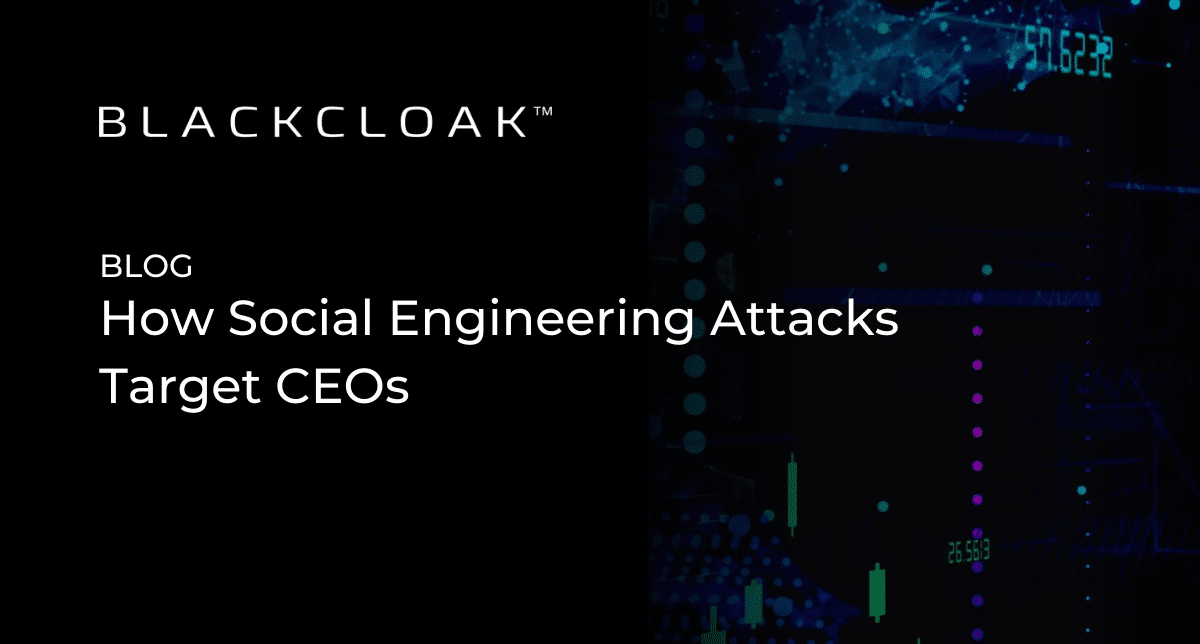How Social Engineering Attacks Target CEOs

Social engineering is a type of cybersecurity attack that aims to manipulate victims into sharing personal information, revealing account login, or exposing sensitive information that compromises their personal and/or company’s security, privacy, and finances.
While 2022 estimates are still being accounted for, it has been assessed that 6.9 billion was stolen through social engineering in 2021 alone.
Business executives are at a heightened risk of encountering aggressive and sophisticated social engineering attacks, not only because of their personal wealth and high-profile status, but because of the access and influence they possess within their company.
After all, when an executive’s email or social accounts are compromised, it opens the door to numerous other lateral attacks that can penetrate nearly every facet of a company.
It is for that reason executive cyber protection against social engineering attacks is of paramount importance for CEOs and their organizations alike.
This is why cybersecurity experts at BlackCloak put together a guide on social engineering attacks: how to identify them, and how executives can remain protected.
Notable Social Engineering Threats to CEOs
Hackers use various strategies to circumvent executive cyber protections and gain access to their accounts and private information. They may pose as a trusted brand, government authority, business partners, banks, social and streaming services, or even trusted members of their own company.
While there are many types of social engineering attacks hackers use to target potential victims, here are some of particular note, often used to target executives and other high-profile company members.
1. Spear Phishing and Whaling
Phishing attacks are often familiar methods hackers use to target potential victims, but there are important distinctions between the different types of phishing attacks.
Spear phishing attacks, where scammers research potential victims to build a more-convincing illusion to mask their malicious intentions.
Whaling spear phishing attacks that target specific individuals with high wealth or privileged status to company information and resources.
CEOs are at particular risk of spear phishing and whaling attacks. Due to the high value of the assets available through an executive’s account, these whaling attacks are often strategic, well-researched, and highly complex.
No executive threat protection is complete without extensive protections against whaling and other advanced phishing attacks.
2. Smishing
Smishing attacks are another common social engineering attack against CEOs, they are phishing attacks in the form of SMS text messages.
Almost everyone with a phone has received a Smishing attack attempt, and many hackers’ tactics have become old hat. Advanced and complex SMS phishing attacks can still be effective, even against CEOs who are well-trained in cybersecurity awareness.
Many executives maintain hundreds or even thousands of business contacts on their phones, making it more difficult to parse out legitimate communication from illegitimate.
3. Pretexting
Pretexting is a broad term for when scammers disingenuously offer to provide necessary technical support—for an issue of their own making. Scammers often claim to be security specialists offering to help fix cybersecurity issues.
CEOs should be aware many scammers are willing to extensively research a company’s cybersecurity services, including the names, titles, and departments that typically offer these services, to make their scam as convincing as possible.
4. Honeypot Scams
Honeypot scams are social engineering attacks designed to deceive victims with promises of romance, companionship, or other alluring offers.
In these scenarios, scammers may pretend to be someone they are not—but that isn’t always the case. Some scammers are willing to perpetuate extensive, false relationships—even arranging in-person interactions—to manipulate their victims into sharing personal information.
5. Home Network Attacks
Executives remain at risk of social engineering attacks 24/7/365, including at home.
The level of cyber protection in the home networks and personal accounts of executives is often not comparable to the quality of their corporate cyber protection. Therefore, social engineering hackers employ a variety of tactics to breach the digital lives of executives and their families gaining access to their business and personal data.
How CEOs Protect Themselves Against Social Engineering
Beyond the basics of general security awareness training, thorough executive cyber protection against social engineering requires additional hardware and software defenses to combat the threats they face. These include:
1. VPN
A Virtual Private Network (VPN) provides executive cyber protection and anonymity when CEOs browse the web. Using a VPN can protect executives by hiding their public IP address and location, which helps limit the amount of personal and identifying information that scammers can access.
2. Multi-Factor Authentication
With MFA protections on accounts, even if social engineering hackers learn an executive’s passwords, they cannot access those accounts.
3. Data Broker Removal Services
Scams like whaling and pretexting are built on the personal information hackers gather about executives before they begin their attacks. Data removal services ensure that much of the personal information collected by data broker websites are no longer available to hackers online.
4. Personal Cybersecurity Services
Spam filters, secure email gateways, spam-call blockers, and virus and malware protection can help mitigate some of the phishing attacks targeting executives. But even more advanced technologies will help make a significant difference in reducing risk. Endpoint cybersecurity, automatic protection against zero-day exploits, and regular penetration testing can help keep executive cybersecurity robust and ready to deal with a myriad of digital threats.
5. Home Network Cyber Protection
Home network security protections help protect executives for the other twelve hours of the day when they aren’t working. These safeguards protect home offices, personal accounts, and the digital privacy of executives and their families.
BlackCloak: Concierge Digital Executive Protection
BlackCloak is the premier executive cybersecurity service designed to protect CEOs at home, on vacation, or anywhere their lives take them.
Our award-winning world-class personal cybersecurity services ensure you and your family will have executive cyber protection against social engineering threats, while our white-glove concierge service can address all your needs and questions whenever you have them.
Do you have questions about social engineering threats or other topics related to executive cyber protection?
Contact the BlackCloak personal cybersecurity experts today.









